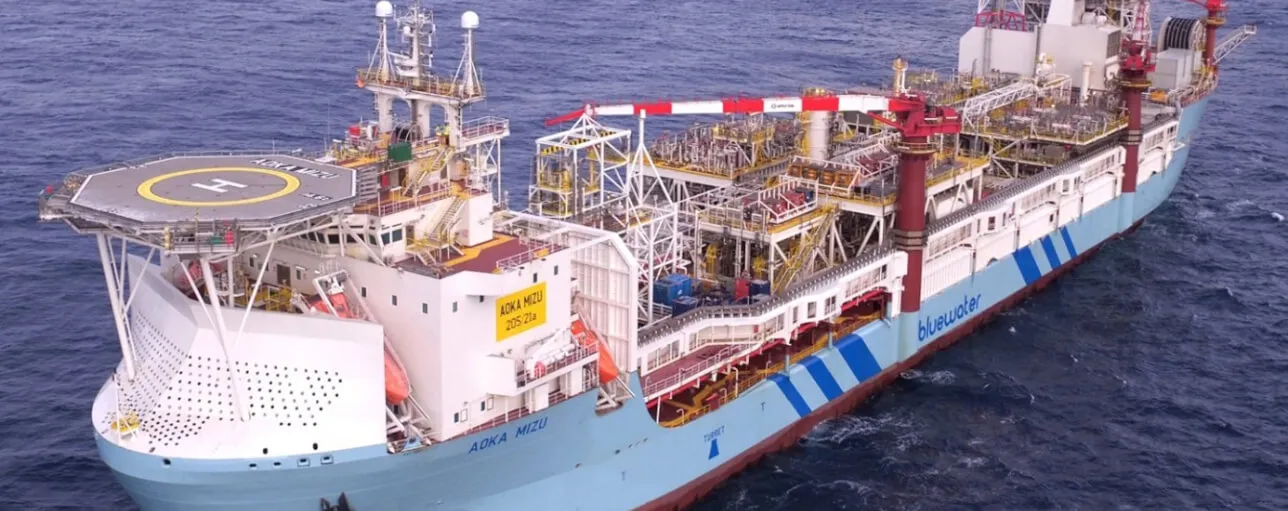The offshore industry has set its course to decarbonization, and the industry needs to find solutions to reach emission targets. Electrification and thus reducing fuel consumption is an obvious choice if the electrical offshore infrastructure can be realized.
ARNHEM, The Netherlands, 17 March, 2022 - Bluewater Energy Services has partnered with DNV to conduct a technology review study, including a state-of-the-art evaluation of the technical possibilities to feed FPSO’s and FSO’s from externally located sources of electrical power.
The study determined which technologies are currently or imminently available for powering an offshore floating installation (FPSO) from an external location, with the ambition to transmit 50-80 MW of electrical power across up to 200 km distance using 50 Hz grid frequency. Furthermore, the study identified the most relevant and critical components within the transmission system that are required to externally power an FPSO. Low frequency AC and HVDC have been considered separately.
Two major technical challenges have been addressed:
- The challenge of transmitting this amount of power across a distance up to 200 km in the form of a 50 Hz AC electric current.
The substantial reactive power production of the submarine cable constraints the maximum possible transmission distance. The study showed, by example, that for a 200 km-long transmission distance, a maximum of approximately 55 MW of power can be transmitted at a voltage level of 65 kV while 80 MW can be transmitted at a voltage level of 80 kV across approximately 165 km. - The challenge of evaluating the technology readiness levels (TRL) for the components and sub-systems of such an offshore transmission system.
For all relevant components and sub-systems of a capable offshore transmission system, the technology readiness levels (TRL) according to API RP 17 N have been evaluated. This was done for all components required for making a high voltage transmission system up to and including the FPSO. Some alternative solutions have been included like deployment of a subsea transformer nearby the FPSO, allowing a medium voltage connection to the FPSO.
The study revealed few components that limit the TRL to a level of four with qualification programs ongoing to resolve this constraint in the near future.
The report gives Bluewater and DNV a clear understanding of the technical possibilities that are available today and the opportunity to further focus on technology developments to enable future (re)deployment of FPSOs without emissions from offshore power generators. utilizing green/renewable power sources.
Bluewater and DNV are open for engagements and discussions with key players in the offshore sector, like offshore field owners and contractors in floating wind, tidal and solar, to make the next step in decarbonization and emission less solutions offshore.
Bluewater
Since its foundation in 1978, Bluewater Energy Services has built a technological lead specialized in design, development and operation of safe, innovative and reliable offshore mooring and floating energy production systems.
Existing offshore solutions of Bluewater include Single Point Mooring Systems (SPMs) and Floating Production, Storage and Offloading units (FPSOs). Bluewater is committed to decarbonize and to produce emission less energy offshore. Amongst others, this includes floating solutions to harvest renewable energy offshore like wind, solar and tidal power. Learn more at www.bluewater.com.
DNV
DNV is an independent assurance and risk management provider, operating in more than 100 countries. Through its broad experience and deep expertise DNV advances safety and sustainable performance, sets industry standards, and inspires and invents solutions.
Whether assessing a new ship design, qualifying technology for a floating wind farm, analysing sensor data from a gas pipeline or certifying a food company's supply chain, DNV enables its customers and their stakeholders to manage technological and regulatory complexity with confidence.
Driven by its purpose, to safeguard life, property, and the environment, DNV helps its customers seize opportunities and tackle the risks arising from global transformations. DNV is a trusted voice for many of the world’s most successful and forward-thinking companies.
In the energy industry
DNV provides assurance to the entire energy value chain through its advisory, monitoring, verification, and certification services. As the world's leading resource of independent energy experts and technical advisors, the assurance provider helps industries and governments to navigate the many complex, interrelated transitions taking place globally and regionally, in the energy industry. DNV is committed to realizing the goals of the Paris Agreement, and supports customers to transition faster to a deeply decarbonized energy system.
Learn more at www.dnv.com
